The Mavericks Hang In There
The Mavericks Hang In There

Leading up to last night’s game, the NBA Finals had gone as nearly everyone expected: the Miami Heat have played better than the Dallas Mavericks, and they have behaved worse. Game One was a textbook Heat win and exemplified why this match-up is so difficult for the Maverick defenders. LeBron James and Dwyane Wade performed their “I go, now you go” routine and Dirk Nowitzki’s “I go, now…hey you’re a really old and streaky shooter” was simply no match for them.
Game Two was a textbook “Why everyone hates the Heat” loss. Their boorish antics toward the end of the second game, preening and prancing about, throwing fake punches at each other, staring down the Mavericks bench while being up 15 points with 7 minutes left, was actually startling. I have seen a lot of classless acts by great teams — the Pistons refusal to shake the Bulls’ hands after Jordan finally beat them in ’91 comes easily to mind — but I have never seen players put their own egos before actually winning the game. The disrespect they showed the Mavericks was just what it appeared to be — a handful of pampered millionaires with a manufactured grudge trying to look hard.
It was a curious tack to take given the Dallas Mavericks had a more difficult road to these Finals than the Heat did. For the Heat to think they could toy with the Mavericks was the height of arrogance. And guess what? The Mavericks showed that they didn’t buy a ticket to the NBA Finals themselves, and clawed back, while everyone in the free world (other than Heats fans) rejoiced. Not just because the hero-takes-a-fall theme has been popular since Biblical times, or because those of us who like crappy basketball teams are bitter and jealous of the Heat’s wealth of talent. But because we like it when jerks get their comeuppance.
Afterward, James and Wade displayed a defensiveness that would’ve come in handy during the penultimate seven minutes of the game. Wade questioned whether his extended pose while standing virtually atop the Mavericks bench players could be construed as celebrating. Apparently, in his eyes, celebrating involves confetti and balloons. James did his textbook “you all” media excoriation. And Chris Bosh said that is defense on Nowitzki on the final possession cost his team “two points.” Erik Spoelstra, who coached the final stretch as if he had a softball lodged in his throat, was defiant, telling his team that they had been in that situation “many times before.” Whatever you say, Coach, but can you please stop dressing like a guest at a rom-com wedding?
Dallas was hyped up for Game Three, but never seemed to get in the groove and Miami did just enough to win. I figured that was it: the Heat, having survived the Mavericks’ emotional surge would make it a tidy five-game win. Maybe six. They looked more like a championship team and less like the cast of Honey during rehearsals.
And so as Game Four unfolded I expected the Mavs to try and keep it close, but lose. Even the Abe Lincoln tattoo on Deshawn Stevenson’s neck looked skeptical of his team’s chances. Yet who could have anticipated LeBron James scoring eight measly points on 3-of-11 shooting? If you follow any of Twitter’s NBA pontificators, they have been contorting themselves to give the Heat superstars some context, alternately comparing James then Wade to Michael Jordan. Even last night, they were smugly waiting for LeBron to “take this over” and Wade to “finish them, like Mike.”
Except Wade missed that free throw right at the end (like Mike never did) and LeBron scored 50% fewer points than Jason Terry. I said very early this season that maybe LeBron (who has now had three mediocre Finals games under his elastic waistband) is just a really good Scottie Pippen. Maybe.
And just like that, with the 86–83 win, the Mavericks have created a credible path to the title: win Game Five at home, and one of two in Miami, which is not exactly the greatest home court advantage in NBA history.
Earlier yesterday I would’ve thought the Heat wouldn’t be taxed again this series, and I would have to stop watching basketball for the next five months. But the Mavericks are resilient and gritty, and they’ve hung around long enough to make me believe in them. Even though they are older than Lou Rawls’ older brother, they are compelling to watch, have a great, measured coach and we may actually have the privilege of seeing Commissioner David Stern hand team owner Mark Cuban the Larry O’Brien Trophy, through gritted teeth.
If that happens, you’ll surely see some dancing and it won’t just be in front of the Heat bench. It will be all over America.
Tony Gervino is a New York City-based editor and writer obsessed with honing his bio to make him sound quirky. He can also be found here.
Inebriate Stumbles
If you like to watch drunks falling down you should certainly click through here.
The Next New World

One of the things I sometimes do to keep the bad thoughts out of my head when I’m walking down the street alone is try to imagine what someone who was magically transported from the 1970s or so to now would think about everything they saw. Mostly, I guess, he or she would be shocked by the amount of advertising everywhere, the fact that hardly anybody smokes anymore and the rampant obesity. Also, what is this panini and why do all the delis seem to sell them? In that same vein, let’s look at this item from BBC News and take a moment to consider how much our world has changed in an even briefer period.
Fusion Joint Gets Savage Beatdown
The last sentence in Sam Sifton’s most recent restaurant review is pretty brutal.
Woman Allowed to Write Television Scripts

In a brave experiment, Molly McAleer, a biological woman who lives in Los Angeles, has been hired by showrunner Michael Patrick King for CBS’ “Two Broke Girls,” which was picked up by the network in mid-May, and will allegedly air between “How I Met Your Mother” and “Two and a Half Men.”
The repercussions of having a woman writing TV are unknown but we expect the very worst.
"Read It Later": Republishing is Theft
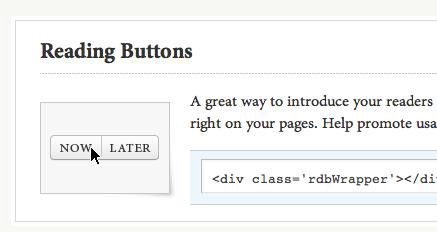
Yesterday Apple introduced a new version of Safari, along with a ton of other stuff, and it has something they call Reader. Some time back, we’d all heard that Apple was getting into the game, with what people were calling “Reading List,” which would let you “collect webpages.” This language was suspicious and largely wrong. What Reader does is pop up a nice, easy-readin’ overlay over the website you’re “at,” allowing you to read without distraction — and also to print it or to email it to a friend. It deals with pagination really well; it looks great, and it makes sense.
Its sensible structure is, at least in part, I imagine, because Apple has lawyers. And because big companies are risk adverse, and they know what theft is.
And it does make things read real nice.
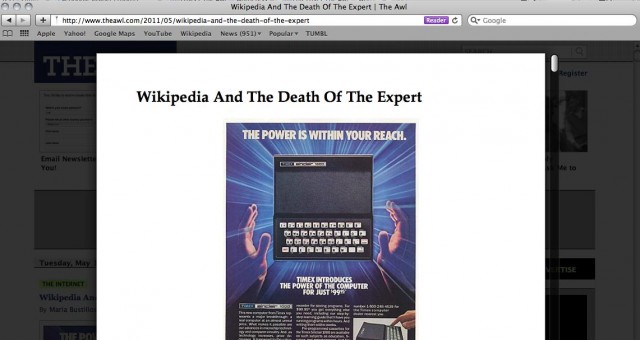
Other services in this new and crowded space are sensibly unthreatened by Apple’s rollout. There’s a lot of words on the Internet, so there’s room for a lot of tools to read. But not all these tools operate the same.
There’s Readability, which passes something along: “70% of all membership fees go directly to the publishers and content creators in your reading list,” they say. People like this: “the best part is that Readability divides up the lion’s share of your monthly fee and gives it to the publishers whose content you’re reading. So you get ad-free clean reading from all over the web, while the content can still be self funding.”
The big jump in thinking there is “self funding.” $3.50 each month, divided among everyone on everyone’s “reading list”… that’s not a replacement for advertising-supported publishing. (Readability is still small, as well — the bulk is not there for actual income at this time.)
Readability wants to attract publishers with an appeal to their self-interest: “You can actively promote this revenue channel with our embeddable reading button”!
But it’s not actually a “revenue channel,” except at great bulk (if you had three million readers via Readability, that’d be income, and great for writers). As it stands, it’s a reduction-in-revenue channel.
Yet it’s far more attractive than other options.
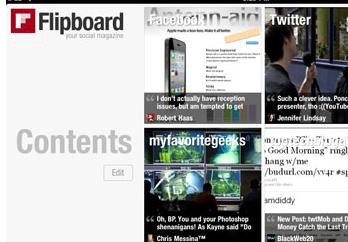
There’s Flipboard, which sucks content into an iPad magazine form. Flipboard is much-loved and quite handsome. I like it! They have information for publishers too: “What does Flipboard Pages do for me?” their FAQ asks. Well:
Flipboard has attracted a valuable and high-growth audience of social influencers and enthusiastic readers with one of the most popular apps on the iPad. We believe this more beautiful, more readable layout will increase your viewership and cause more people to retweet, share and like your content. Ultimately, we’d like to help you monetize your content better with the addition of stylish, print magazine-like full-page ads.
You? You get paid in Tweets, baby.
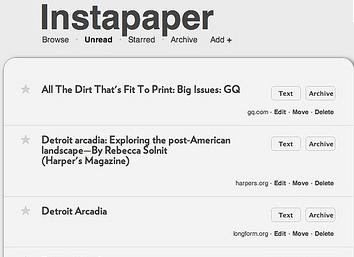
Then there’s Instapaper, the darling of reading services. (Another product I quite like!) It was pointed out early on that Instapaper is, at best, copyright infringement.
Instapaper costs $4.99 for app use, and it’s a “a regular business run by a regular person, so it earns income to cover its costs.” None of those costs are fees to republish in full content published elsewhere, which is exactly what Instapaper does. They do however provide an “opt-out” for publishers: “To opt out, have your site’s legal owner or copyright agent click here to contact Instapaper with the internet domain names of the site(s) you wish to opt out of text-parser compatibility. Please provide contact information for identity verification, including a daytime office phone number.”
They note that no “major publishers” (whatever those are) have yet opted out.
If you become a publisher who opts out of such things, you have foolishly become a Prince Rogers Nelson, serving C&Ds; daily, leaving empty embedded YouTube posts all over the digital world. That’d be dumb! Why not make readers happy? Why not sacrifice some of the money that is coming to writers so readers can be happy? I guess?
If you complained every single time someone decided that an RSS feed was somehow an invitation to republish in full on the web or elsewhere, you’d never have the time to actually help create the material that these people then republish with their own fees and ads. But being put in this situation is particularly cruel, it feels like, to sites that are attempting to prioritize paying writers — something that is a struggle! (And a struggle that will be won, but only after a long time coming.)
I would say that all of these publishers are awesome in many ways at heart! They love reading! They want people reading! And shouldn’t use of these tools be a gift from publishers to eager readers? But also it’s true that some of the proprietors of these services don’t care about the finances of the creation of writing at all. They don’t want to see “all that junk”: they’re hostile; they say things like they don’t see why they should feel personally responsible for someone else’s ad impressions. They just want to reaaaad and be free, man. But they are responsible, if they want people to make words for them. I hope at least they’re downloading someone else’s mp3s to listen to while they’re reading.
Each Reader is an Author, A Maker of Meaning
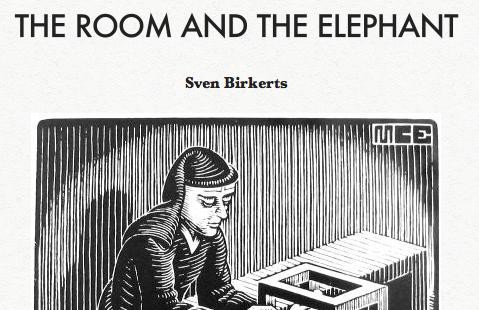
The pace of change in our world is pretty rough on the nostalgicists among us. On the other hand, you might also say that the nostalgicists are living in boom times, because there is more and more to regret the passing of. This paradox came to mind as I read Sven Birkerts’s essay today in the Los Angeles Review of Books. He wrote it in response to “Wikipedia and the Death of the Expert,” which I published here in mid-May.
It’s really an honor to be read so closely by so distinguished a critic, I must say. Gives one a rather Eliza Doolittle-like feeling, like being invited to dance by the prince of Transylvania. But Birkerts made the same error a number of readers did with the piece, which was in assuming that its purpose was to call for a wake, and toast the wonders of the digital age over the casket of the hapless Expert. Not so.
The new models of understanding evident in crowdsourced projects like Wikipedia simply refocus our appreciation on the expertise, rather than on the expert.
There’s a particular reason why this is a valuable development, a reason that Birkerts already understands far better than I do.
…I see that Bustillos believes that the traditional place of the author is being superseded. In the world according to 2.0, these are deemed to be some of the big changes of our moment. Expertise, authorship, individual creativity: out. Team collaborations, Wikipedia: in. Inevitably: “Knowledge is growing more broadly and immediately participatory and collaborative by the moment.”
Here’s my question: didn’t Barthes prefigure all this back in 1968, when he explained that “it is really critical readers who decide and thus determine what a piece of writing means” (to borrow Wallace’s decoction)? Barthes wrote The Death of the Author not in an attempt to stop anybody from writing books, but in order to improve our understanding of the real workings of literature. My observations regarding the Expert have the same intentions.
The value of individual creativity in itself, authorship in itself, is not affected a bit by how we share the proceeds afterward. The “making” or “originating” role of Tolstoy is the same whether we read him as New Critics or as poststructuralists. The difference is in ascribing ownership to authorship.
By this reckoning, in the case of crowdsourced knowledge, each advance, each made thing, each insight, is a new point of departure; each reader is an author, a maker of meaning who can contribute something new. And now, perhaps even something permanent. Barthes had no way of knowing that fifty years on, it would be possible for every text to become a palimpsest of ideas and information, as Wikipedia is now. I wonder what he would have made of it all.
Prof. Birkerts doesn’t approve of flippancy with respect to cultural matters. He was particularly upset that I referred to Walter Pater as a “guy”, for example.
Here I am far less interested in Bustillos’ reasoning, which is mainly that of the leap-frogging enthusiast, than I am in the assumptive tone, the manner, the confidence. It is a tone we often hear in the voices of those who believe their historical moment has come. It dares a mocking intonation, a casual dismissiveness: Pater is a “guy” and Lanier, standing up for individuality and authorship, well, he too is a “guy.”
I would not fasten so readily on Bustillos’ breezily casual mode if it did not seem to be, beyond a baiting tactic, a harbinger of new attitudes. How better to get after any stance or idea than by first de-dignifying its proponents? Tolstoy — who cyber-agitator Clay Shirkey [sic] dismissed as unreadable two years ago — becomes the guy who wrote all those long battle scenes, Michelangelo the guy who painted all those great abs on people….
This is pretty much exactly how I would describe Michelangelo and Tolstoy, it’s true. Does it “de-dignify” the achievements of either man, no no no. Do I have reverence for the man, no, no more for one man than another; for his achievements — that is another matter. (Just to clarify, I love and admire the works of Tolstoy. Rilke’s too.)
(One little error, Birkerts cites a remark I quoted from Canadian theologian David Lochhead, but ascribed it to McLuhan.)
Bustillos’ real agenda, which she gets at by way of issues of said expertise and of collaboration, is to lay out two diametrically opposed conceptions of the human and then, in effect, to cast her vote. Here we have the split, the road-fork issuing in two paths that would with every step take the pilgrim on one further from his counterpart on the other. There is no eventual convergence. The one is the path — the ideal — of the individualized self, the other is the path of the socially and neurally collectivized self, along which, at some undetermined point, the idea of “self” itself must blur away, become a term no longer applicable.
I just can’t see these things in terms of “diametrically opposed conceptions of the human.” And I really do not see a fork, there, but a million paths; a network that we can travel on freely and in all directions.
Finally, I would say that the “self” will blur away much as the idea of the “reader” as a single passive recipient of literary meaning has blurred away, viz., not at all. If anything, the role of readers was clarified and amplified by the poststructuralist movement. That is to say, readers had been reading and understanding books the whole time and in much the same way; after Barthes and Derrida, we have come to understand better how this process works. (And we still have all the tools of not only the New Critics but the Romantics to use in understanding literature, if we like. I tend to prefer the old-fashioned tools myself, which is why reading Birkerts can be a real pleasure; he’s unabashedly old-fashioned in a way that is warm and comforting.)
If we extrapolate all this to the arena of knowledge-making rather than just literature-making, we get past “the ownership of an idea” the same way the late 20th c. got past the Author.
Maria Bustillos is the author of Dorkismo and Act Like A Gentleman, Think Like A Woman.
Prince Turns 53 Today
“Happy 53rd Birthday, Prince Rogers Nelson. You are definitely one of the world’s ‘Favorite Blacks.’ We know this not because of all the joy your music has brought your millions of fans. But because in 1985 you and your band, the Revolution, were presented the honor ‘Favorite Black Album’ at the American Music Awards (by Huey Lewis and Madonna, no less). The irony of this is that you didn’t even win that award for your raw-as-hell The Black Album (which didn’t come out till a few years later and scared all your pop fans who never heard Dirty Mind; we had to buy that shit on a bootleg cassette behind the counter at an 8th Street head shop like it was contraband). You won it for Purple Rain.”
— Ego Trip celebrates Prince’s birthday well.
Oh, Just The Sun Exploding
The Sun totally ripped one: “What you’re seeing here is a solar flare (an enormous explosion of pent-up magnetic energy) coupled with a prominence (a physical eruption of gas from the surface). This event blasted something like a billion tons of material away from the Sun. Note the size of it, too: while it started from a small region on the Sun’s surface, it quickly expanded into a plume easily as big as the Sun itself! I’d estimate its size at well over a million kilometers across. It looks like most of the material fell back down to the Sun’s surface; that’s common, though sometimes such an event manages to blast the material completely away into space.” We are totally on Team Sun to begin with, mostly because it’s NOT THE MOON, but this awesome display of solar flatulence makes our devotion even that much more worthwhile.
